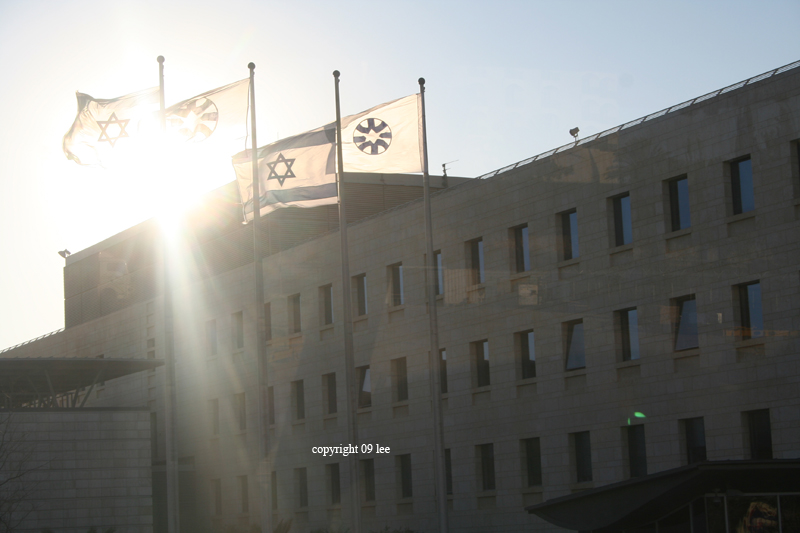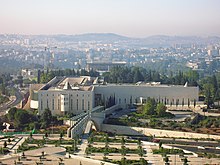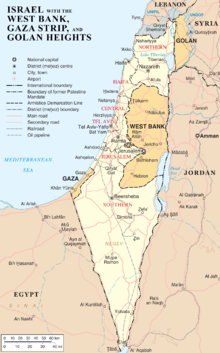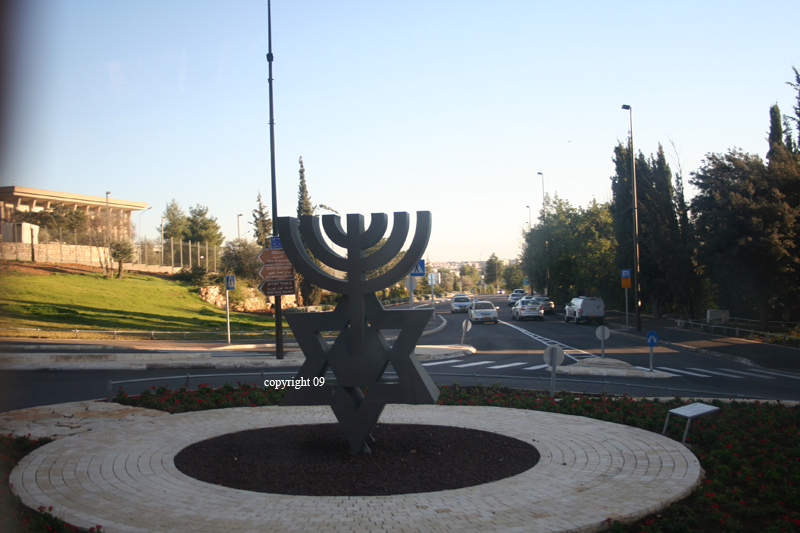|

Government
::Israel

Israel operates under a parliamentary system as a
democratic republic with universal suffrage.The President
of Israel is the head of state, but his duties are limited
and largely ceremonial. Parliament Member supported by a
majority in parliament becomes the Prime Minister, usually
the chairman of the largest party. The Prime Minister is
the head of government and head of the Cabinet. Israel is
governed by a 120-member parliament, known as the Knesset.
Membership of the Knesset is based on proportional
representation of political parties, with a 2% electoral
threshold, which commonly results in coalition
governments.
Parliamentary elections are scheduled every four years,
but unstable coalitions or a no-confidence vote by the
Knesset often dissolves governments earlier. "The
average life span of an Israeli government is 22 months.
The peace process, the role of religion in the state, and
political scandals have caused coalitions to break apart
or produced early elections." The Basic Laws of
Israel function as an uncodified constitution. In 2003,
the Knesset began to draft an official constitution based
on these laws.
Legal
system
Main article: Israeli judicial system

The Israeli Supreme Court, Givat
Ram, Jerusalem.
Israel has a three-tier court system. At the lowest
level are magistrate courts, situated in most cities
across the country. Above them are district courts,
serving both as appellate courts and courts of first
instance; they are situated in five of Israel's six
districts. The third and highest tier in Israel is the
Supreme Court, seated in Jerusalem. It serves a dual role
as the highest court of appeals and the High Court of
Justice. In the latter role, the Supreme Court rules as a
court of first instance, allowing individuals, both
citizens and non-citizens, to petition against decisions
of state authorities. Although Israel supports the goals
of the International Criminal Court, it has not ratified
the Rome Statute, citing concerns about the ability of the
court to remain free from political impartiality.
In addition to the three-tier court system described
above (also known as the "General Court system")
Israel has also a system of specialized Labour Courts,
similar to those found in Continental Europe. The Labour
Courts have unique jurisdiction over labour matters (both
on the individual and collective spheres) as well as
social welfare matters (e.g. law suits related to
pensions, social security benefits, healthcare, etc.).
Each one of the five judicial districts has one Regional
Labour Court which serves as a first instance court for
those matters described above.
Most matters in Labour Courts are adjudicated by a
three-panel consisting of one professional judge, and two
lay representatives nominated to the court with the
consent of the largest employees and employers unions (one
representative termed as "Employees
Representative" and the other as "Employers
Representative"). Some matters (e.g. criminal cases
related to labour law) are adjudicated by a professional
judge only. The National Labour Court, situated in
Jerusalem, serves as an appeal court as well as a
first-instance court for matters with national importance
(e.g. collective bargaining disputes, on a national level,
between employees and employers unions).
Israel's legal system combines English common law,
civil law, and Jewish law. It is based on the principle of
stare decisis (precedent) and is an adversarial
system, where the parties in the suit bring evidence
before the court. Court cases are decided by professional
judges rather than juries. Marriage and divorce are under
the jurisdiction of the religious courts: Jewish, Muslim,
Druze, and Christian. A committee of Knesset members,
Supreme Court justices, and Israeli Bar members carries
out the election of judges. Administration of Israel's
courts (both the "General" courts and the Labor
Courts) is carried by the Administration of Courts,
situated in Jerusalem. It is to be noted that both the
General and Labor courts are paperless courts, i.e.
storage of court files, as well as court decisions, are
carried out electronically.
Israel's Basic Law: Human Dignity and Liberty seeks to
defend human rights and liberties in Israel. Israel is the
only country in the region ranked "Free" by
Freedom House based on the level of civil liberties and
political rights; the "Israeli Occupied
Territories/Palestinian Authority" was ranked
"Not Free." In 2010, Israel was also the only
country in the Middle East to be ranked "free"
by Freedom House's "Freedom of the Press report,
ranking the highest in the region.
Administrative
districts
Districts of Israel: (1) Northern, (2) Haifa,
(3) Center, (4) Tel Aviv, (5) Jerusalem,
(6) Southern
The State of Israel is divided into six main
administrative districts, known as mehozot (מחוזות;
singular: mahoz) – Center, Haifa, Jerusalem,
North, Southern, and Tel Aviv Districts. Districts are
further divided into fifteen sub-districts known as nafot
(נפות; singular: nafa),
which are themselves partitioned into fifty natural
regions.
| Number |
District |
Main City |
Provinces |
Number of Residents |
| 1 |
North |
Nazareth |
Kinneret, Safed, Acre, Golan, Jezreel Valley |
1,242,100 |
| 2 |
Haifa |
Haifa |
Haifa, Hadera |
880,000 |
| 3 |
Center |
Ramla |
Rishon Lezion,
Sharon (Netanya), Petah Tikva, Ramla, Rehovot |
1,770,200 |
| 4 |
Tel Aviv |
Tel Aviv |
Tel Aviv |
1,227,000 |
| 5 |
Jerusalem |
Jerusalem |
Jerusalem |
910,300 |
| 6 |
South |
Beersheba |
Ashkelon, Beersheba |
1,053,600 |
| B |
Judea and
Samaria |
Modi'in Illit
(Largest city) |
--- |
304,569 |
For statistical purposes, the country is divided
into three metropolitan areas: Tel Aviv metropolitan
area (population 3,206,400), Haifa metropolitan area
(population 1,021,000), and Beer Sheva metropolitan
area (population 559,700).Israel's largest
municipality, both in population and area, is
Jerusalem with 773,800 residents in an area of 126 square
kilometers (49 sq mi) (in 2009).
Israeli government statistics on Jerusalem include
the population and area of East Jerusalem, which is
widely recognized as part of the Palestinian
territories under Israeli occupation. Tel Aviv, Haifa,
and Rishon LeZion rank as Israel's next most populous
cities, with populations of 393,900, 265,600, and
227,600 respectively.
Occupied
territories
Main article: Israeli-occupied territories
In 1967, as a result of the Six-Day War, Israel
gained control of the West Bank, East Jerusalem, the
Gaza strip and the Golan Heights. Israel also took
control of the Sinai Peninsula, but returned it to
Egypt as part of the 1979 Israel-Egypt Peace Treaty.

Map of Israel showing the West Bank, the Gaza
Strip, and the Golan Heights
Following Israel's capture of these territories,
settlements consisting of Israeli citizens were
established within each of them. Israel has applied
civilian law to the Golan Heights and East Jerusalem,
incorporating them into its territory and offering
their inhabitants permanent residency status and the
possibility to become full citizen if they asked it.
In contrast, the West Bank has remained under military
occupation, and it and the Gaza Strip are seen by the
Palestinians and most of the international community
as the site of a future Palestinian state.The UN
Security Council has declared the incorporation of the
Golan Heights and East Jerusalem to be "null and
void" and continues to view the territories as
occupied.The International Court of Justice, principal
judicial organ of the United Nations, determined in
its 2004 advisory opinion on the legality of the
construction of the Israeli West Bank barrier that the
lands captured by Israel in the Six-Day War, including
East Jerusalem, are occupied territory.
The status of East Jerusalem in any future peace
settlement has at times been a difficult hurdle in
negotiations between Israeli governments and
representatives of the Palestinians. Most negotiations
relating to the territories have been on the basis of
United Nations Security Council Resolution 242, which
emphasises " the inadmissibility of the
acquisition of territory by war", and calls on
Israel to withdraw from occupied territories in return
for normalization of relations with Arab states, a
principle known as "Land for peace".
The West Bank was annexed by Jordan in 1948,
following the Arab rejection of the UN decision to
create two states in Palestine. Only Britain
recognized this annexation and Jordan has since ceded
its claim to the territory to the PLO. The West Bank
was occupied by Israel in 1967. The population are
mainly Arab Palestinians, including refugees of the
1948 Arab-Israeli War.]
From their occupation in 1967 until 1993, the
Palestinians living in these territories were under
Israeli military administration. Since the Israel-PLO
letters of recognition, most of the Palestinian
population and cities have been under the internal
jurisdiction of the Palestinian Authority, and only
partial Israeli military control, although Israel has
on several occasions redeployed its troops and
reinstated full military administration during periods
of unrest. In response to increasing attacks as part
of the Second Intifada, the Israeli government started
to construct the Israeli West Bank barrier. When
completed, approximately 13 % of the Barrier will
be constructed on the Green Line or in Israel with 87 %
inside the West Bank.
The Gaza Strip was occupied by Egypt from 1948 to
1967 and then by Israel after 1967. In 2005, as part
of Israel's unilateral disengagement plan, Israel
removed all of its settlers and forces from the
territory. Israel does not consider the Gaza Strip to
be occupied territory and declared it a "foreign
territory". That view has been disputed by
numerous international humanitarian organizations and
various bodies of the United Nations. Following June
2007, when Hamas assumed power in the Gaza Strip,
Israel tightened its control of the Gaza crossings
along its border, as well as by sea and air, and
prevented persons from entering and exiting the area
except for isolated cases it deemed humanitarian.Gaza
has a border with Egypt and an agreement between
Israel, the EU, the PA and Egypt governed how border
crossing would take place (it was monitored by
European observers), until June 2006, following the
abduction of the soldier Gilad Shalit, when the
crossing agreement ceased to exist.As of 2010 the
Rafah border crossing was controlled by Egypt.Internal
control of Gaza is in the hands of Hamas.
Foreign
relations
Main article: Foreign relations of Israel
Israel maintains diplomatic relations with 161
countries and has 94 diplomatic missions around the
world. Only
three members of the Arab League have normalized
relations with Israel; Egypt and Jordan signed peace
treaties in 1979 and 1994, respectively, and
Mauritania opted for full diplomatic relations with
Israel in 1999. Two other members of the Arab League,
Morocco and Tunisia, which had some diplomatic
relations with Israel, severed them at the start of
the Second Intifada in 2000. Since 2003, ties with
Morocco have been improved, and Israel's foreign
minister has visited the country.
As a result of the 2009 Gaza War, Mauritania, Qatar,
Bolivia, and Venezuela suspended political and
economical ties with Israel. ]
Under Israeli law, Lebanon, Syria, Saudi Arabia, Iraq,
and Yemen are enemy countries
and Israeli citizens may not visit
them without permission from the Ministry of the
Interior. Since
1995, Israel has been a member of the Mediterranean
Dialogue, which fosters cooperation between seven
countries in the Mediterranean Basin and the members
of the North Atlantic Treaty Organization.

Shimon Peres, current President of Israel,
greeted by U.S. President Barack Obama at the
White House.
Foreign relations with United States, Germany, and
India are among Israel's strongest.
The United States was the first country to
recognize the State of Israel, followed by the Soviet
Union. The United States may regard Israel as its
primary ally in the Middle East, based on "common
democratic values, religious affinities, and security
interests".]
The United States has provided total economic and
military funding to Israel of over $100bn since 1962
under the Foreign Assistance Act, more than any other
country,and Israel currently receives more than half
of the total annual funds from the United States
Foreign Military Financing program. Their bilateral
relations are multidimensional and the United States
is the principal proponent of the Arab-Israeli peace
process. The United States and Israeli views differ on
some issues, such as the Golan Heights, Jerusalem, and
settlements.
India established full diplomatic ties with Israel
in 1992 and has fostered a strong military,
technological and cultural partnership with the
country since then. One study revealed that India was
the most pro-Israel nation in the world. India is the
largest customer of Israeli military equipment and
Israel is the second-largest military partner of India
after the Russian Federation. India is also the
second-largest Asian economic partner of Israel and
the two countries enjoy extensive space technology
ties.
Germany's strong ties with Israel include
cooperation on scientific and educational endeavors
and the two states remain strong economic and military
partners. Under the reparations agreement, as of 2007
Germany had paid 25 billion euros in reparations to
the Israeli state and individual Israeli holocaust
survivors. The UK has kept full diplomatic relations
with Israel since its formation having had two visits
from heads of state in 2007. Relations between the two
countries were also made stronger by former prime
minister Tony Blair's efforts for a two state
resolution. The UK is seen as having a
"natural" relationship with Israel on
account of the British Mandate for Palestine. Iran had
diplomatic relations with Israel under the Pahlavi
dynasty but withdrew its recognition of Israel during
the Iranian Revolution.
Although Turkey and Israel did not establish full
diplomatic relations until 1991,Turkey has cooperated
with the State since its recognition of Israel in
1949. Turkey's ties to the other Muslim-majority
nations in the region have at times resulted in
pressure from Arab and Muslim states to temper its
relationship with Israel.Relations between Turkey and
Israel took a downturn after the Gaza War and Israel's
raid of the Gaza flotilla. IHH, which organized the
flotilla, is a Turkish charity that some believe has
ties to Hamas and Al-Qaeda.
In Africa, Ethiopia is Israel's main and closest
ally in the continent due to common political,
religious and security interests. Israel provides
expertise to Ethiopia on irrigation projects and
thousands of Ethiopian Jews (Beta Israel) live in
Israel.
wikipidia

|
Country name:
|
|
conventional long form: State
of Israel
conventional short form: Israel
local long form: Medinat
Yisra'el
local short form: Yisra'el
|
|
|
Government type:
|
|
parliamentary democracy
|
|
|
Capital:
|
|
name: Jerusalem
geographic coordinates: 31
46 N, 35 14 E
time difference: UTC+2
(7 hours ahead of Washington, DC during Standard
Time)
daylight saving time: +1hr,
begins last Friday in March; ends the Sunday
between the holidays of Rosh Hashana and Yom
Kippur
note: Israel
proclaimed Jerusalem as its capital in 1950, but
the US, like all other countries, maintains its
Embassy in Tel Aviv
|
|
|
Administrative divisions:
|
|
6 districts (mehozot, singular - mehoz);
Central, Haifa, Jerusalem, Northern, Southern,
Tel Aviv
|
|
|
Independence:
|
|
14 May 1948 (from League of Nations mandate
under British administration)
|
|
|
National holiday:
|
|
Independence Day, 14 May (1948); note - Israel
declared independence on 14 May 1948, but the
Jewish calendar is lunar and the holiday may
occur in April or May
|
|
|
Constitution:
|
|
no formal constitution; some of the functions of
a constitution are filled by the Declaration of
Establishment (1948), the Basic Laws of the
parliament (Knesset), and the Israeli
citizenship law; note - since May 2003 the
Constitution, Law, and Justice Committee of the
Knesset has been working on a draft constitution
|
|
|
Legal system:
|
|
mixture of English common law, British Mandate
regulations, and in personal matters Jewish,
Christian, and Muslim legal systems; has not
accepted compulsory ICJ jurisdiction
|
|
|
Suffrage:
|
|
18 years of age; universal
|
|
|
Executive branch:
|
|
chief of state: President
Shimon PERES (since 15 July 2007)
head of government: Prime
Minister Binyamin NETANYAHU (since 31 March
2009)
cabinet: Cabinet
selected by prime minister and approved by the
Knesset
elections: president
largely a ceremonial role and is elected by the
Knesset for a seven-year term (one-term limit);
election last held 13 June 2007 (next to be held
in 2014 but can be called earlier); following
legislative elections, the president, in
consultation with party leaders, assigns the
task of forming a governing coalition to a
Knesset member who he or she determines is most
likely to accomplish that task
election results: Shimon
PERES elected president; number of votes in
first round - Shimon PERES 58, Reuven RIVLIN 37,
Colette AVITAL 21; PERES elected president in
second round with 86 votes (unopposed)
|
|
|
Legislative branch:
|
|
unicameral Knesset (120 seats; political parties
are elected by popular vote and assigned seats
for members on a proportional basis; members
serve four-year terms)
elections: last
held on 10 February 2009 (next scheduled
election to be held in 2013)
election results: percent
of vote by party - Kadima 23.2%, Likud-Ahi
22.3%, YB 12.1%, Labor 10.2%, SHAS 8.8%, United
Torah Judaism 4.5%, United Arab List 3.5%,
National Union 3.4%, Hadash 3.4%, The Jewish
Home 3%, The New Movement-Meretz 3%, Balad 2.6%;
seats by party - Kadima 28, Likud-Ahi 27, YB 15,
Labor 13, SHAS 11, United Torah Judaism 5,
United Arab List 4, National Union 4, HADASH 4,
The Jewish Home 3, The New Movement-Meretz 3,
Balad 3
|
|
|
Judicial branch:
|
|
Supreme Court (justices appointed by Judicial
Selection Committee - made up of all three
branches of the government; mandatory retirement
age is 70)
|
|
|
Political parties and leaders:
|
|
Balad [Jamal ZAHALKA]; Democratic Front for
Peace and Equality (HADASH) [Muhammad BARAKEH];
Kadima [Tzipora "Tzipi" LIVNI]; Labor
Party [Ehud BARAK]; Likud [Binyamin NETANYAHU];
National Union [Yaakov KATZ]; SHAS [Eliyahu
YISHAI]; The Jewish Home (HaBayit HaYehudi)
[Daniel HERSCHKOWITZ]; The New Movement-Meretz [Haim
ORON]; United Arab List-Ta'al [Ibrahim SARSUR];
United Torah Judaism or UTJ [Yaakov LITZMAN];
Yisrael Beiteinu or YB [Avigdor LIEBERMAN]
|
|
|
Political pressure groups and leaders:
|
|
B'Tselem [Jessica MONTELL, Executive Director]
monitors human rights abuses; Peace Now [Yariv
OPPENHEIMER, Secretary General] supports
territorial concessions in the West Bank and
Gaza Strip; YESHA Council of Settlements [Danny
DAYAN, Chairman] promotes settler interests and
opposes territorial compromise; Breaking the
Silence [Yehuda SHAUL, Executive Director]
collects testimonies from soldiers who served in
the West Bank and Gaza Strip
|
|
|
International organization participation:
|
|
BIS, BSEC (observer), CERN (observer), CICA,
EBRD, FAO, IADB, IAEA, IBRD, ICAO, ICC, ICRM,
IDA, IFAD, IFC, IFRCS, ILO, IMF, IMO, IMSO,
Interpol, IOC, IOM, IPU, ISO, ITSO, ITU, ITUC,
MIGA, OAS (observer), OECD (accession state),
OPCW (signatory), OSCE (partner), Paris Club
(associate), PCA, SECI (observer), UN, UNCTAD,
UNESCO, UNHCR, UNIDO, UNWTO, UPU, WCO, WHO, WIPO,
WMO, WTO
|
|
|
Diplomatic representation in the US:
|
|
chief of mission: Ambassador
Michael OREN
chancery: 3514
International Drive NW, Washington, DC 20008
telephone: [1]
(202) 364-5500
FAX: [1]
(202) 364-5607
consulate(s) general: Atlanta,
Boston, Chicago, Houston, Los Angeles, Miami,
New York, Philadelphia, San Francisco
|
|
|
Diplomatic representation from the US:
|
|
chief of mission: Ambassador
James B. CUNNINGHAM
embassy: 71
Hayarkon Street, Tel Aviv 63903
telephone: [972]
(3) 519-7575
FAX: [972]
(3) 516-4390
consulate(s) general: Jerusalem;
note - an independent US mission, established in
1928, whose members are not accredited to a
foreign government
|
|
|
Flag description:
|
|
white with a blue hexagram (six-pointed linear
star) known as the Magen David (Shield of David)
centered between two equal horizontal blue bands
near the top and bottom edges of the flag; the
basic design resembles a Jewish prayer shawl (tallit),
which is white with blue stripes; the hexagram
as a Jewish symbol dates back to medieval times
|
|
|
National anthem:
|
|
name: "Hatikvah"
(The Hope)
lyrics/music: Naftali
Herz IMBER/traditional, arranged by Samuel COHEN
note: adopted
2004, unofficial since 1948; used as the anthem
of the Zionist movement since 1897; the 1888
arrangement by Shmuel COHEN is thought to be
based on the Romanian folk song "Carul cu
boi" (The Ox Driven Cart)
|
cia fact |












